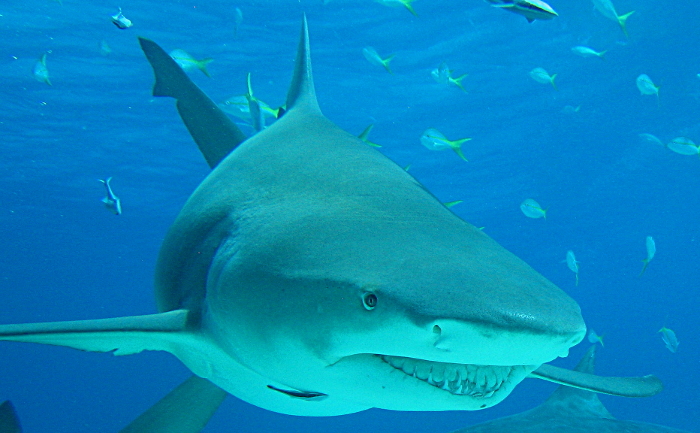The Sustainable Shark Fisheries and Trade Act
A Fisherman’s Farce
If you think
that the shark fin trade is confined to Asia and a few dingy warehouses
along the coast that are “somewhere else,” the fact is that all of the
shark fisheries in the United States of America are part of the deadly
trade. With The Sustainable Shark Fisheries and Trade Act, shark
fishermen are pushing hard to make sure that they will continue to be
able to profit from it and disseminating a large amount of propaganda
about it that does not reflect the true facts.
They claim that
they fish sharks sustainably, so should not have to give up their
lucrative profits. But the fact is that sustainable shark fishing is
nothing but a fishermen’s farce.
If history has taught us
anything, it is that no animals can stand up to sustained, targeted,
commercial killing—not whales, not turtles, not fish, and not sharks.
Sharks
have become so valuable due to the rising demand for their fins that
intensive shark fishing spans all oceans and it is associated with much
illegal activity, including murder. No record is kept of most shark
kills, so the idea that the entire shark fin trade is going to be made
sustainable, under the guidance of the USA, is ridiculous. In fact just
the documented shark fin trade, which is a tiny fraction of the true
numbers, proves that shark Fisheries have underestimated the numbers of
sharks killed by at least 400%.
It is the Sustainable Shark Alliance
(SSA), which represents shark fishermen, dealers, and processors, and
those who advocate their views (shark fisheries scientists, lawyers, and
lobbyists), who promote H.R. 788, The Sustainable Shark Fisheries and Trade Act of 2019. They
actually admit that without the profit from shark fins, shark fisheries
in the USA will be shut down. The only profitable part of the shark is
its fins. (However, all shark fishermen in countries where sharks were protected, had to give up the profit from the fins.)
They
reason that American shark fishermen fish sustainably, so they should
be able to sell their shark fins on the lucrative shark fin market. They
promote the idea that if only shark fins from sustainable fisheries are
used for shark fin soup, this will put an end to shark finning
worldwide, and those countries who continue to practice it will suffer.
However
the numbers reveal that the large market for shark fins in the USA
could never be filled by fins from sustainable shark fisheries, for only
a few of them may temporarily exist.
The USA is the seventh
largest shark fishing nation in the world. It imports several hundred
tons of shark fins annually and this amount is rising yearly, in spite
of bans in such major centers as California and New York. Scientific
studies have shown that the alleged markets for shark meat have resulted
from the fins attached policies. The fins are taken and a vast surplus
of toxic shark meat is thrust on the market. As a result it is being
used in everything including make-up and dogfood.
Sharks are so valuable that they are always killed for the money for their fins--such profits rival those of the drug trade.
Fisheries advocates claim that:
- If the shark fin trade is banned, more sharks will be killed, because fishermen will have to catch more sharks to make the same amount of money.
- The fins should be used because of the general principle that the whole shark should be used.
- Sharks are really being killed for meat, not for their fins.
- If American fishermen don’t kill the sharks and supply the shark fin trade, “bad actors” will kill them.
But
these arguments are not based on science, facts, or logic, and rely on
political bias and rhetoric. While it sounds like a good idea to import,
export, and sell products that only come from ‘sustainable’ fisheries, The Sustainable Shark Fisheries and Trade Act of 2019 is completely unrealistic to put into practice.
Fisheries
governance regimes are very expensive to set up and operate, and the
cost varies depending on the type of measures implemented, ranging from
scientific advice and management to monitoring, control, surveillance,
and enforcement. Every country in the world with a shark fishery would
need to be lobbied to pass sustainable shark fisheries management
legislation. When laws are in place and enough data has been collected
to determine what the sustainable catch rates might be for each species
caught in every shark fishery, development and funding of management
plans would need to be put in place, including staffing, training,
purchase of equipment, and so on. Then, enforcement plans would need to
be developed, implemented, and funded.
The problems of who would
set the standard, who would lobby other countries to accept the USA’s
evaluation of what is sustainable, who would monitor the program,
research, and pay for it, are all unaddressed. Whether the American
public would be willing to finance it through their tax dollars has not
been mentioned.
These costs tend to fall on the public sector while the benefits are enjoyed by fishermen.
All
that is involved in the Sustainable Shark Fisheries and Trade
Act—putting American practices into play on a global scale—would need to
be maintained long-term, while somehow requiring every country to keep
politics, financial self-interest, and corruption, to say nothing of
criminality, out of the process.
There is no international body
that can force sovereign countries to do anything on this scale. Some
countries, especially those with large fisheries, have consistently been
resistant to controls on fishing based on scientific data.
Europol
reported in 2018 that illegal fishing of tuna was twice that of legal
fishing in the Atlantic. If it is not possible to effectively manage a
species for which there is probably more data than any other, the idea
that the USA will create sustainably managed fisheries for all 500 shark
species (and all fish species) throughout the entire world is absurd.
Further,
World Trade Organization agreements require that no country can favour
the imports of one nation over another, nor ban imports of a product
while still locally producing and exporting the product. The Sustainable Shark Fisheries and Trade Act
would appear to be in direct violation of those agreements, and
Fisheries advocates have not stated how the USA will get around this.
A World Bank study, Sunken Billions 2009, and Sunken Billions Revisited, 2017, has found that unsustainable
Fisheries management practices have led to globally depleted fish
stocks that produce $83 billion less in annual net benefits than would
otherwise be the case. Ninety percent of fisheries are
over-exploited. To address this global crisis, the main requirement is
that fishing effort is diminished, while at the same time, fish stocks
must be rebuilt, and coastal ecosystems returned to a state of health.
This
study specifies that little is known about the actual carrying capacity
of most fish stocks that are subject to commercial exploitation, and
that Fisheries’ data are often highly uncertain.
Sunken Billions
predicts that social unrest will result from the necessary reduction of
fishing effort that must come, because some fishermen will have to turn
to other occupations. So the current outcry from the shark fishing
industry has been predicted, and is understandable, but indefensible.
The
World Bank recommends that the fishing subsidies that have facilitated
over-fishing in the past, be used to ease this social transition.
(c) Ila France Porcher, 2019
See also:





Comments